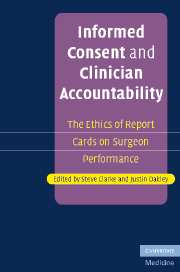Book contents
- Frontmatter
- Contents
- List of contributors
- Acknowledgements
- Introduction: Accountability, informed consent and clinician performance information
- Part I Accountability
- Part introduction
- 1 Clinician report cards and the limits of evidence-based patient choice
- 2 Report cards for institutions, not individuals
- 3 Safety, accountability, and ‘choice’ after the Bristol Inquiry
- 4 Public reports: putting patients in the picture requires a new relationship between doctors and patients
- 5 Adverse event disclosure: benefits and drawbacks for patients and clinicians
- 6 Report cards and performance monitoring
- Part II Informed consent
- Part III Reporting performance information
- Index
- References
Part introduction
Published online by Cambridge University Press: 08 August 2009
- Frontmatter
- Contents
- List of contributors
- Acknowledgements
- Introduction: Accountability, informed consent and clinician performance information
- Part I Accountability
- Part introduction
- 1 Clinician report cards and the limits of evidence-based patient choice
- 2 Report cards for institutions, not individuals
- 3 Safety, accountability, and ‘choice’ after the Bristol Inquiry
- 4 Public reports: putting patients in the picture requires a new relationship between doctors and patients
- 5 Adverse event disclosure: benefits and drawbacks for patients and clinicians
- 6 Report cards and performance monitoring
- Part II Informed consent
- Part III Reporting performance information
- Index
- References
Summary
Accountability
In the United Kingdom a key driver of reforms in healthcare has been the public perception that there has been a failure of regulatory mechanisms in healthcare. These concerns were particularly focused on the Bristol Royal Infirmary scandal. The ‘Kennedy Report’ from the subsequent national inquiry into this scandal concluded that the culture of medicine required systematic change. In particular, the Report recommended that the conformist ‘club culture’ of the British National Health Service be transformed into a ‘patient-centred’ culture in which the quality and safety of medical services becomes of paramount concern and the potential for substandard service to be provided and for attempts to hide evidence of substandard service is minimised (Bristol Royal Infirmary Inquiry, 2001). The broad thrust of the Kennedy Report was that this transformation is to be achieved by the use of mechanisms designed to ensure accountability. Although the Kennedy Report did not specifically recommend that surgeon-specific performance data be publicly released, it recommended (among other things) the publication of performance indicators that would enable evidence of underperformance to be identified early on, and would help improve healthcare safety and quality by discouraging underperformance in the medical system (Bristol Royal Infirmary Inquiry, 2001). The key recommendations of the Kennedy report were taken up enthusiastically by the Blair government, which has generally been in favour of establishing formal mechanisms to ensure accountability in the public sector (Smith, 2005).
- Type
- Chapter
- Information
- Informed Consent and Clinician AccountabilityThe Ethics of Report Cards on Surgeon Performance, pp. 25 - 26Publisher: Cambridge University PressPrint publication year: 2007



